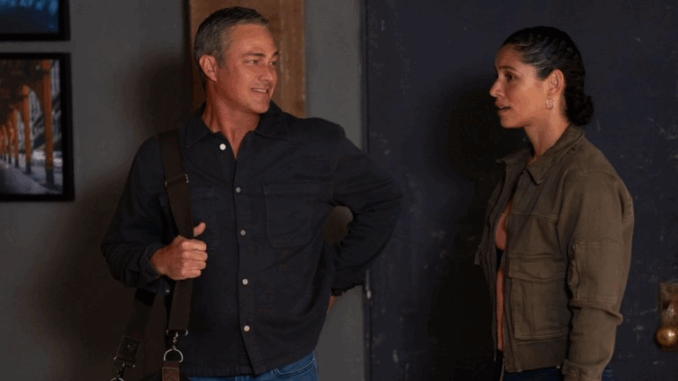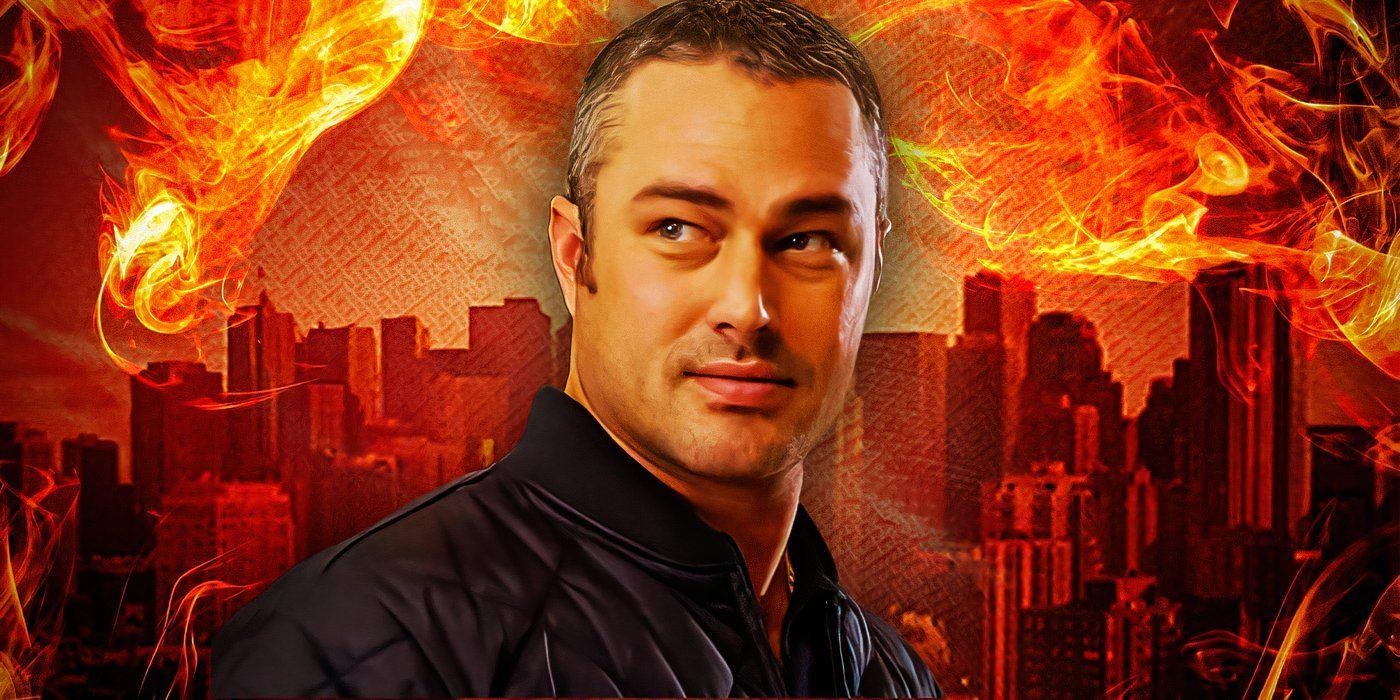
For more than a decade, the roar of sirens and the crackle of flames from Chicago Fire have been the heartbeat of NBC’s primetime lineup — a symbol of courage, loyalty, and the unbreakable brotherhood of Firehouse 51. At the center of that blaze stands Taylor Kinney, the cool-headed, fiercely loyal, and often unpredictable Lieutenant Kelly Severide, a man whose moral complexity and quiet charisma helped transform Chicago Fire from a procedural drama into an emotional epic.
But now, as the series prepares to march deeper into its second decade, one question has begun to echo louder than the alarms themselves:
Will Taylor Kinney stay — or is his time at Firehouse 51 finally coming to an end?
It’s a question that has left fans restless, producers cautious, and the future of the One Chicago universe hanging in a delicate, smoky haze.
A Legacy Forged in Flames
Since its explosive debut in 2012, Chicago Fire has been more than a show — it’s been a television institution. Its blend of high-stakes rescues and deeply personal storytelling turned the ensemble cast into a second family for viewers. And through it all, Taylor Kinney’s Severide became its most magnetic anchor — a flawed hero whose journey from impulsive playboy to steadfast leader mirrored the show’s own evolution.
Severide wasn’t just another firefighter. He was the emotional heartbeat of the series, a man wrestling with loyalty, love, and loss while risking his life for the city he served. His relationship with Stella Kidd (portrayed with fierce authenticity by Miranda Rae Mayo) grew into the show’s emotional centerpiece — a love story as fiery as the blazes they fought.
“To many fans,” one NBC executive privately admits, “Chicago Fire without Severide is like Chicago without the skyline. You could still see the city, but it would never look quite the same.”
A Shock That Rocked the Firehouse
That skyline dimmed — at least temporarily — during Season 11, when Kinney abruptly took a leave of absence for personal reasons. The news broke quietly, but the impact was seismic. Writers scrambled to craft a believable exit — ultimately sending Severide off to an arson investigation training program — while fans flooded social media with concern.
For months, the absence loomed large, and whispers of uncertainty began to ripple through the One Chicago fandom. Would he return? Was this the beginning of the end?
When Kinney finally reappeared in later episodes, relief swept across the fandom. But for many, his return came with a new layer of unease — a realization that even the strongest flame could flicker.
“He’s the foundation of the show,” said one longtime crew member. “But when he stepped away, everyone felt the tremor. It reminded us that no one is irreplaceable — not even Severide.”
The Network’s Strategic Silence
In the months following his return, NBC and Wolf Entertainment released a series of carefully worded statements. They praised Kinney’s dedication, teased exciting storylines ahead, and celebrated the reunion of Firehouse 51’s full ensemble. But beneath that optimism lay a telling absence: not one word about long-term commitments.
“Networks rarely discuss individual contracts,” explains industry analyst Jenna Fields. “But when a star’s future is secure, they tend to lean into that stability. The fact that there’s no explicit mention of multi-year renewals means everything — and nothing — at the same time.”
In other words: NBC is thrilled to have Taylor Kinney now. Beyond that? The silence speaks volumes.
And in Hollywood, silence often signals negotiation — or uncertainty.
Between Comfort and Change
From a practical standpoint, Kinney’s decision — whether to remain or move on — is complex. On one hand, Chicago Fire offers something most actors dream of: stability, legacy, and a fiercely loyal fanbase. The Dick Wolf franchise is one of television’s most dependable machines, a steady paycheck and creative home rolled into one.
Yet, after more than a decade playing the same character, even the most iconic roles can start to feel like gilded cages.
“Long-running shows can be both a blessing and a burden,” says one former network insider. “They provide consistency, but they also limit growth. After so many years, you start wondering what’s next — what story hasn’t been told yet.”
Kinney’s brief hiatus in 2023 highlighted another reality: personal well-being trumps professional continuity. After years of grueling production schedules — often filming in Chicago’s harsh winters — the actor made it clear he needed time to focus on himself.
“He’s one of the hardest-working guys I’ve ever met,” a close friend told Entertainment Weekly. “But even he realized he needed to breathe. The show will always be there, but your health and peace of mind come first.”
The Human Behind the Hero
Part of what makes Taylor Kinney so beloved — both by fans and colleagues — is his quiet authenticity. He doesn’t chase headlines. He doesn’t post for attention. When he speaks, it’s deliberate, thoughtful, and grounded.
During recent interviews, Kinney reflected on how Chicago Fire shaped him personally:
“When you spend this many years telling stories about sacrifice, teamwork, and loss,” he said, “some of that stays with you. These people — my castmates, the crew — they’ve become part of my life. Firehouse 51 isn’t just a set. It’s family.”
That word — family — has become central to Kinney’s connection with the series. It’s why the idea of leaving isn’t just a professional decision; it’s an emotional one.
But even families evolve. And as Kinney enters a new chapter in his career and life, fans are left wondering whether that evolution will pull him toward new artistic horizons or back into the comforting glow of the firehouse.
NBC’s Calculated Hope
Behind the scenes, sources suggest that NBC remains cautiously optimistic. The network is aware of Kinney’s immense value to the One Chicago brand — both as a performer and as a symbol of its longevity.
“There’s no Chicago Fire without Severide,” one executive admitted off the record. “At least, not the version audiences have loved for 13 seasons.”
Yet the reality of television economics looms large. With streaming reshaping budgets and production schedules tightening, even legacy stars face renewed scrutiny. Renewals depend not just on creative direction, but on contractual balance — and a star’s willingness to stay in the flames.
The Fans’ Eternal Hope
For fans, though, hope burns eternal. Every episode featuring Kinney feels like a small victory — a reassurance that, at least for now, Firehouse 51 remains whole.
“I can’t imagine the show without him,” wrote one fan on Reddit. “Severide isn’t just a character. He’s the soul of the firehouse.”
And so, every lingering glance, every cliffhanger, every storyline that teases uncertainty becomes fuel for speculation. Will Severide finally settle down and mentor the next generation? Will he retire heroically? Or is the show quietly preparing fans for a passing of the torch?

Between Fire and Future
For now, Taylor Kinney’s flame continues to burn — steady, if slightly unpredictable. The man who made Chicago Fire’s heart beat still carries the torch, though whether he’ll keep it for years to come remains one of television’s most tantalizing mysteries.
When asked recently about the possibility of saying goodbye, Kinney smiled, that familiar glint of quiet defiance in his eyes.
“Never say never,” he teased. “You don’t walk away from something that’s a part of you. But sometimes, you need to see what’s beyond the smoke.”
Whatever happens next — whether Kinney stays to fight another blaze or ventures into uncharted creative territory — one thing is certain:
Firehouse 51 will never quite be the same without Kelly Severide.
Because in the city of fire and steel, some flames never die — they just burn differently.